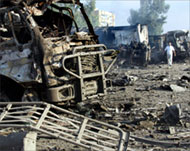Catastrophe looming
France has said the conflict in Lebanon could end in catastrophe and the UN has said the humanitarian situation there is deteriorating.

Philippe Douste-Blazy, the French foreign minister, whose country holds the EU presidency, said the situation on the ground in Lebanon had “significantly deteriorated and there is an urgent need to help civilians”.
“The spiral of violence can only lead to a catastrophe,” he said on Friday.
Speaking after a meeting with his Lebanese counterpart, Fawzi Sallukh, Douste-Blazy called for an immediate ceasefire and for humanitarian aid to be allowed in to ease the suffering of the civilian population.
“We are trying to reach a ceasefire, establish humanitarian corridors and call on all parties to exert self-restraint,” he said, emphasising that France has “denounced the actions of Hezbollah and the disproportionate response of Israel”.
Resolution
He backed the proposal by Kofi Annan, the UN secretary-general, for a settlement that would include the release of the two captured Israeli soldiers, an international conference on Lebanon and the deployment of a stabilisation force on the Lebanon-Israel border.
|
“The spiral of violence can only lead to a catastrophe” Philippe Douste-Blazy, |
Douste-Blazy also called for the implementation of UN Security Council resolution 1559 which demands the disarmament of militias in Lebanon and the deployment of the Lebanese army along the borders with Israel, which have been under the control of Hezbollah.
But Lebanon’s foreign minister, Fawzi Sallukh, accused Israel of having prevented the implementation of resolution 1559 by launching the offensive and by targetting Lebanese army bases.
On Monday Douste-Blazy accompanied his prime minister, Dominique de Villepin, to Beirut in a show of French support for Lebanon.
Humanitarian crisis
Meanwhile, the UN and Red Cross have said that the humanitarian situation in Lebanon is deteriorating rapidly as the country becomes more isolated because of damage to roads, bridges and other structures.
Because of the destruction and the danger of being hit, people have been afraid to go out, and relief has been difficult to provide, officials from the UN said.
 |
|
Aid has been slow in arriving due |
Although supplies are stockpiled, ready to be sent in, moving them has been delayed because of destroyed infrastructure.
The World Health Organisation says it is very concerned about the lack of electricity in hospitals, safe passage of ambulances and access to people in the south of the country.
Christiane Berthiaume, a spokeswoman for the UN World Food Programme, said the agency was appealing to all parties to the conflict to guarantee the save passage of relief supplies.
“A number of different routes, land, sea and air will be required to facilitate the rapid flow of humanitarian goods to the most affected areas.”
She said UN convoys will be clearly marked and officials will give advance notice to the warring sides.